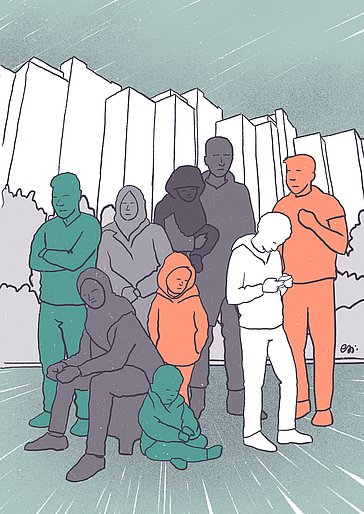
NORTHERN IRAQ
Torn between different worlds
Maryam Rezaie: Northern Iraq - Germany
Khaled Rezaie: Northern Iraq - Germany - Northern Iraq
Maryam Rezaie* cannot find peace and quiet in her accommodation in Bavaria. It is noisy in the refugee camp where she has been living for months. She is suffering from cancer and has to travel to the nearest hospital several times a week for medical treatment.
She lives in constant fear that there will be a Covid-19 outbreak in the accommodation and a curfew will be imposed on all the residents. Then she would not be able to continue the treatments she requires at the clinic. On top of her unstable health situation, the isolation and separation from her family negatively affecting her psyche: She is alone in Germany and misses her four children in northern Iraq and her husband Khaled, who has returned there.
Tolerated, but nothing more
When Maryam was diagnosed with an advanced stage of cancer in northern Iraq, the family initially managed to organise medical treatment locally. But therapies were expensive. After a brief period, the family was deeply in debt and had to look for other ways to continue the cancer treatment. Maryam was lucky and received a visa for medical treatment in Germany. Together with Khaled, but without her children, who did not receive a visa and had to stay with relatives, she set off. After three months in Germany, the authorities decided that Maryam and Khaled should be assigned the status of temporarily tolerated. So they were allowed to stay for a temporary period. Family reunification in Germany is not possible with this status, however.
As the months passed and Maryam underwent several operations, the situation of the children in Iraq was worsening steadily without their parents. So Khaled decided to return to them. He contacted the Central Return Counselling Centre (ZRB) in Nuremberg and signed an agreement providing for assisted return. He was assured of a starting allowance and that his rent in northern Iraq would be paid for a few months. Shortly after his arrival, Khaled was able to return to his old job as a teacher. As is usually the case with state employees in northern Iraq, however, his salary is only paid infrequently, irregularly and sometimes not at all. He is trying to make ends meet for himself and the children. The German return and reintegration programme helped over the short term. In the long run, however, it has not been enough to stabilise the family’s living conditions.
The family faces a perplexing situation: Maryam continues to receive treatment in Germany. Nobody knows whether she can be cured. Her psychological situation is deteriorating perceptibly. Family reunification would only be possible in northern Iraq. But Maryam cannot receive any medical treatment there. And Khaled and the children are not allowed a visitor’s visa for Germany. The situation is driving Maryam and Khaled to despair. The repatriation programme does not make it possible for Maryam to receive medical care or for the family to live together. The programme may refer to "better prospects and a new start in the homeland". For Khaled, things have not turned out that way.
* The names have been changed by the editors.
